Detailed Business Plan: Human Capital Management for Startup Ventures
VerifiedAdded on 2020/12/24
|8
|2116
|185
Report
AI Summary
This report presents a comprehensive business plan for a retail startup, emphasizing the critical role of human capital management. It outlines key elements such as an executive summary, opportunity identification, market analysis, execution strategies, company and management summaries, and a detailed financial plan. The report delves into various aspects of entrepreneurship, including identifying business opportunities, dealing with competitors, and managing risks. It emphasizes the importance of market segmentation, market research, and implementing effective strategies. Furthermore, the report highlights the significance of understanding potential customers, focusing on core competencies, fostering entrepreneurial empowerment, and promoting innovation. The plan also covers marketing strategies, sales plans, and the importance of location and facilities. It stresses the need for technological advancements and the development of skilled employees. The financial plan includes feasibility studies, financial management techniques, and budgeting. The report concludes that a well-structured business plan, incorporating human capital management, is essential for the success of a new venture in the retail industry.
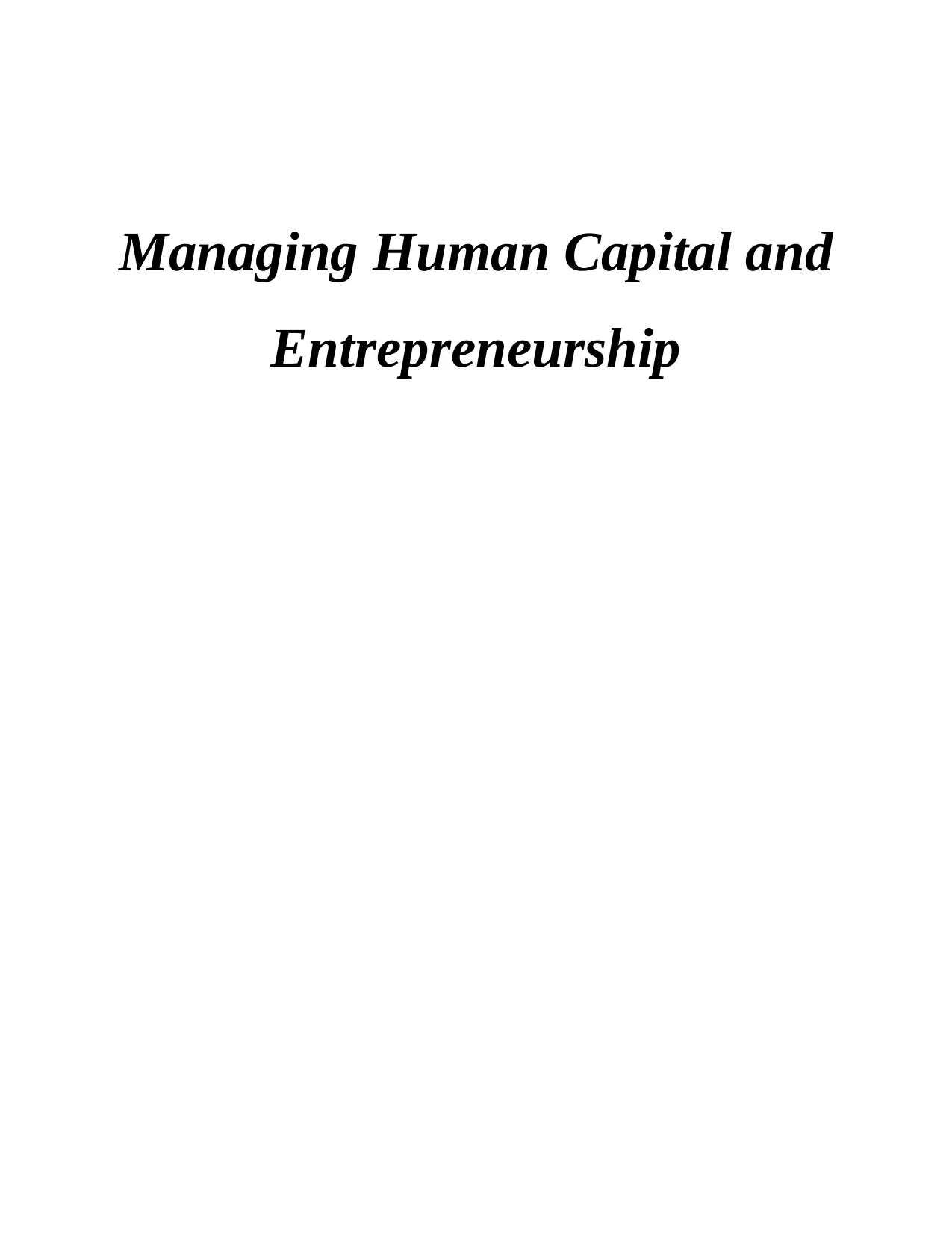
Managing Human Capital and
Entrepreneurship
Entrepreneurship
Paraphrase This Document
Need a fresh take? Get an instant paraphrase of this document with our AI Paraphraser
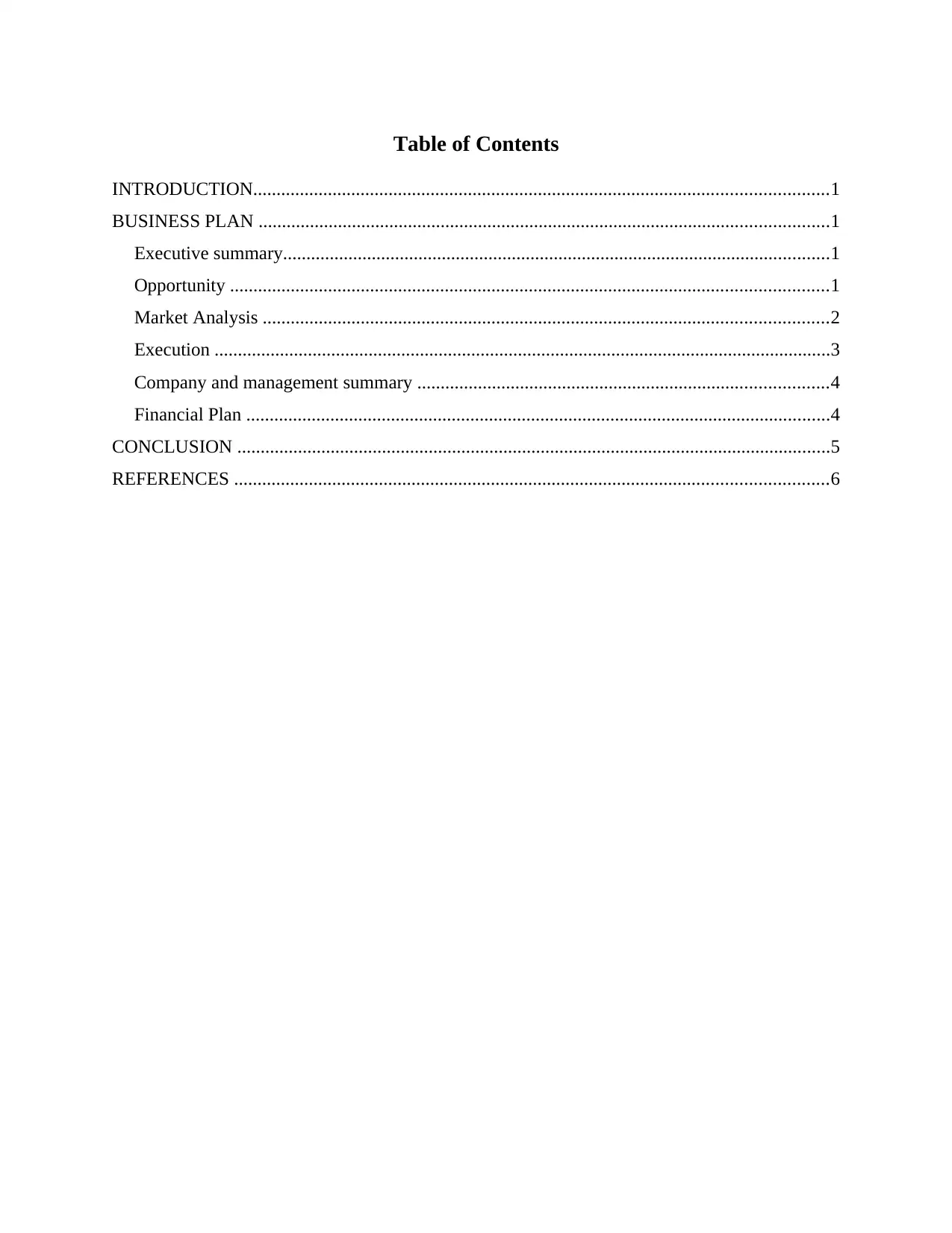
Table of Contents
INTRODUCTION...........................................................................................................................1
BUSINESS PLAN ..........................................................................................................................1
Executive summary.....................................................................................................................1
Opportunity ................................................................................................................................1
Market Analysis .........................................................................................................................2
Execution ....................................................................................................................................3
Company and management summary ........................................................................................4
Financial Plan .............................................................................................................................4
CONCLUSION ...............................................................................................................................5
REFERENCES ...............................................................................................................................6
INTRODUCTION...........................................................................................................................1
BUSINESS PLAN ..........................................................................................................................1
Executive summary.....................................................................................................................1
Opportunity ................................................................................................................................1
Market Analysis .........................................................................................................................2
Execution ....................................................................................................................................3
Company and management summary ........................................................................................4
Financial Plan .............................................................................................................................4
CONCLUSION ...............................................................................................................................5
REFERENCES ...............................................................................................................................6
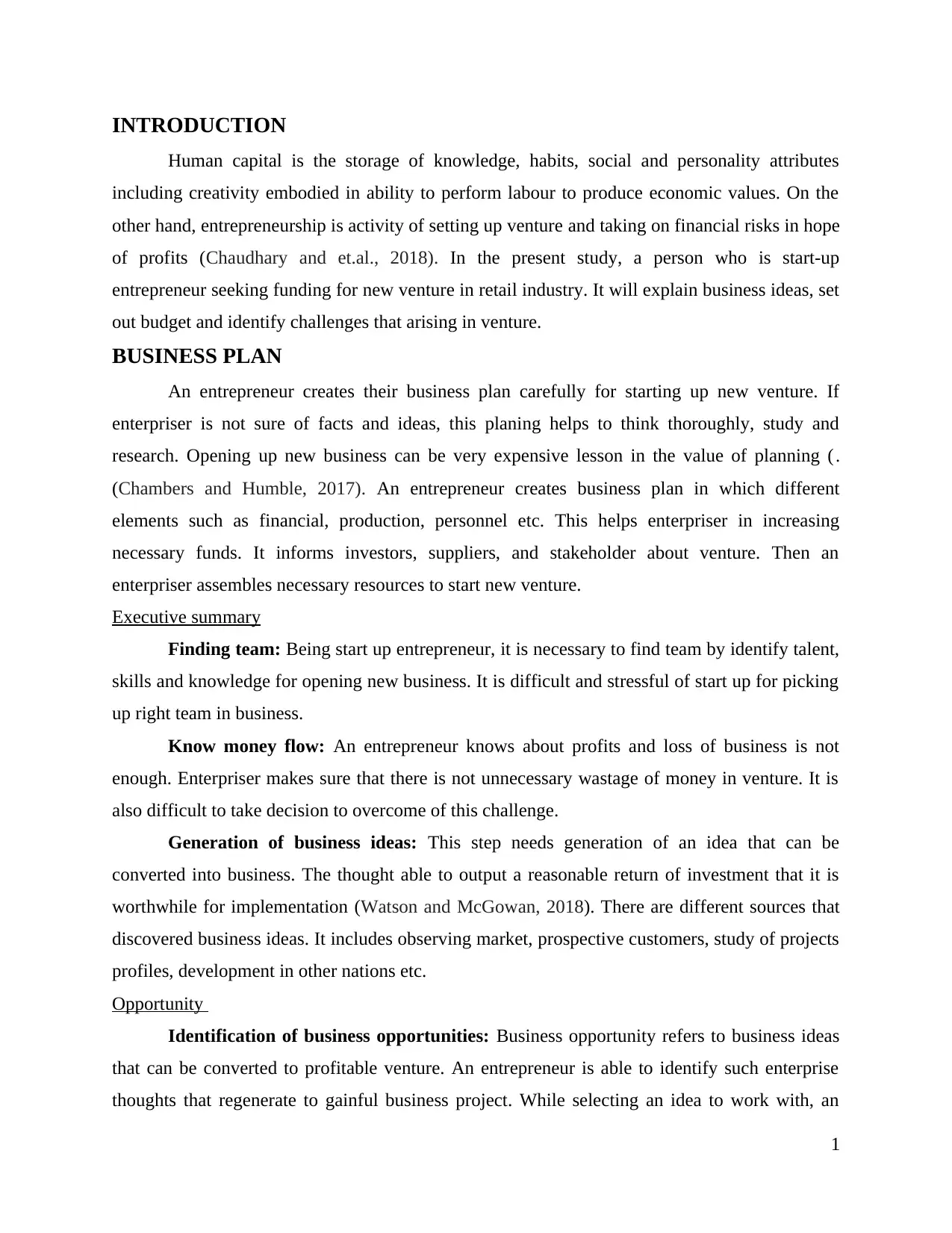
INTRODUCTION
Human capital is the storage of knowledge, habits, social and personality attributes
including creativity embodied in ability to perform labour to produce economic values. On the
other hand, entrepreneurship is activity of setting up venture and taking on financial risks in hope
of profits (Chaudhary and et.al., 2018). In the present study, a person who is start-up
entrepreneur seeking funding for new venture in retail industry. It will explain business ideas, set
out budget and identify challenges that arising in venture.
BUSINESS PLAN
An entrepreneur creates their business plan carefully for starting up new venture. If
enterpriser is not sure of facts and ideas, this planing helps to think thoroughly, study and
research. Opening up new business can be very expensive lesson in the value of planning ( .
(Chambers and Humble, 2017). An entrepreneur creates business plan in which different
elements such as financial, production, personnel etc. This helps enterpriser in increasing
necessary funds. It informs investors, suppliers, and stakeholder about venture. Then an
enterpriser assembles necessary resources to start new venture.
Executive summary
Finding team: Being start up entrepreneur, it is necessary to find team by identify talent,
skills and knowledge for opening new business. It is difficult and stressful of start up for picking
up right team in business.
Know money flow: An entrepreneur knows about profits and loss of business is not
enough. Enterpriser makes sure that there is not unnecessary wastage of money in venture. It is
also difficult to take decision to overcome of this challenge.
Generation of business ideas: This step needs generation of an idea that can be
converted into business. The thought able to output a reasonable return of investment that it is
worthwhile for implementation (Watson and McGowan, 2018). There are different sources that
discovered business ideas. It includes observing market, prospective customers, study of projects
profiles, development in other nations etc.
Opportunity
Identification of business opportunities: Business opportunity refers to business ideas
that can be converted to profitable venture. An entrepreneur is able to identify such enterprise
thoughts that regenerate to gainful business project. While selecting an idea to work with, an
1
Human capital is the storage of knowledge, habits, social and personality attributes
including creativity embodied in ability to perform labour to produce economic values. On the
other hand, entrepreneurship is activity of setting up venture and taking on financial risks in hope
of profits (Chaudhary and et.al., 2018). In the present study, a person who is start-up
entrepreneur seeking funding for new venture in retail industry. It will explain business ideas, set
out budget and identify challenges that arising in venture.
BUSINESS PLAN
An entrepreneur creates their business plan carefully for starting up new venture. If
enterpriser is not sure of facts and ideas, this planing helps to think thoroughly, study and
research. Opening up new business can be very expensive lesson in the value of planning ( .
(Chambers and Humble, 2017). An entrepreneur creates business plan in which different
elements such as financial, production, personnel etc. This helps enterpriser in increasing
necessary funds. It informs investors, suppliers, and stakeholder about venture. Then an
enterpriser assembles necessary resources to start new venture.
Executive summary
Finding team: Being start up entrepreneur, it is necessary to find team by identify talent,
skills and knowledge for opening new business. It is difficult and stressful of start up for picking
up right team in business.
Know money flow: An entrepreneur knows about profits and loss of business is not
enough. Enterpriser makes sure that there is not unnecessary wastage of money in venture. It is
also difficult to take decision to overcome of this challenge.
Generation of business ideas: This step needs generation of an idea that can be
converted into business. The thought able to output a reasonable return of investment that it is
worthwhile for implementation (Watson and McGowan, 2018). There are different sources that
discovered business ideas. It includes observing market, prospective customers, study of projects
profiles, development in other nations etc.
Opportunity
Identification of business opportunities: Business opportunity refers to business ideas
that can be converted to profitable venture. An entrepreneur is able to identify such enterprise
thoughts that regenerate to gainful business project. While selecting an idea to work with, an
1
⊘ This is a preview!⊘
Do you want full access?
Subscribe today to unlock all pages.

Trusted by 1+ million students worldwide
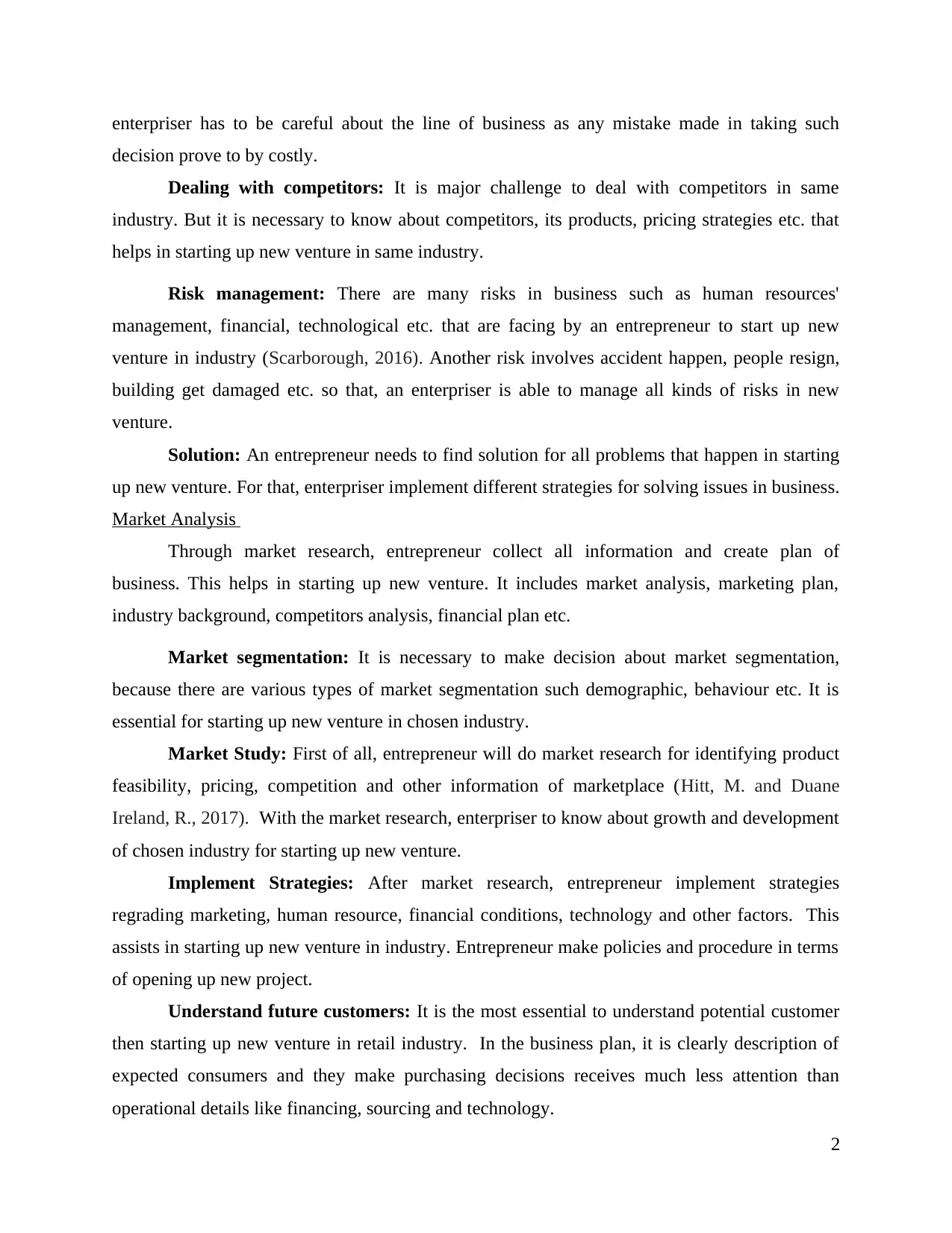
enterpriser has to be careful about the line of business as any mistake made in taking such
decision prove to by costly.
Dealing with competitors: It is major challenge to deal with competitors in same
industry. But it is necessary to know about competitors, its products, pricing strategies etc. that
helps in starting up new venture in same industry.
Risk management: There are many risks in business such as human resources'
management, financial, technological etc. that are facing by an entrepreneur to start up new
venture in industry (Scarborough, 2016). Another risk involves accident happen, people resign,
building get damaged etc. so that, an enterpriser is able to manage all kinds of risks in new
venture.
Solution: An entrepreneur needs to find solution for all problems that happen in starting
up new venture. For that, enterpriser implement different strategies for solving issues in business.
Market Analysis
Through market research, entrepreneur collect all information and create plan of
business. This helps in starting up new venture. It includes market analysis, marketing plan,
industry background, competitors analysis, financial plan etc.
Market segmentation: It is necessary to make decision about market segmentation,
because there are various types of market segmentation such demographic, behaviour etc. It is
essential for starting up new venture in chosen industry.
Market Study: First of all, entrepreneur will do market research for identifying product
feasibility, pricing, competition and other information of marketplace (Hitt, M. and Duane
Ireland, R., 2017). With the market research, enterpriser to know about growth and development
of chosen industry for starting up new venture.
Implement Strategies: After market research, entrepreneur implement strategies
regrading marketing, human resource, financial conditions, technology and other factors. This
assists in starting up new venture in industry. Entrepreneur make policies and procedure in terms
of opening up new project.
Understand future customers: It is the most essential to understand potential customer
then starting up new venture in retail industry. In the business plan, it is clearly description of
expected consumers and they make purchasing decisions receives much less attention than
operational details like financing, sourcing and technology.
2
decision prove to by costly.
Dealing with competitors: It is major challenge to deal with competitors in same
industry. But it is necessary to know about competitors, its products, pricing strategies etc. that
helps in starting up new venture in same industry.
Risk management: There are many risks in business such as human resources'
management, financial, technological etc. that are facing by an entrepreneur to start up new
venture in industry (Scarborough, 2016). Another risk involves accident happen, people resign,
building get damaged etc. so that, an enterpriser is able to manage all kinds of risks in new
venture.
Solution: An entrepreneur needs to find solution for all problems that happen in starting
up new venture. For that, enterpriser implement different strategies for solving issues in business.
Market Analysis
Through market research, entrepreneur collect all information and create plan of
business. This helps in starting up new venture. It includes market analysis, marketing plan,
industry background, competitors analysis, financial plan etc.
Market segmentation: It is necessary to make decision about market segmentation,
because there are various types of market segmentation such demographic, behaviour etc. It is
essential for starting up new venture in chosen industry.
Market Study: First of all, entrepreneur will do market research for identifying product
feasibility, pricing, competition and other information of marketplace (Hitt, M. and Duane
Ireland, R., 2017). With the market research, enterpriser to know about growth and development
of chosen industry for starting up new venture.
Implement Strategies: After market research, entrepreneur implement strategies
regrading marketing, human resource, financial conditions, technology and other factors. This
assists in starting up new venture in industry. Entrepreneur make policies and procedure in terms
of opening up new project.
Understand future customers: It is the most essential to understand potential customer
then starting up new venture in retail industry. In the business plan, it is clearly description of
expected consumers and they make purchasing decisions receives much less attention than
operational details like financing, sourcing and technology.
2
Paraphrase This Document
Need a fresh take? Get an instant paraphrase of this document with our AI Paraphraser
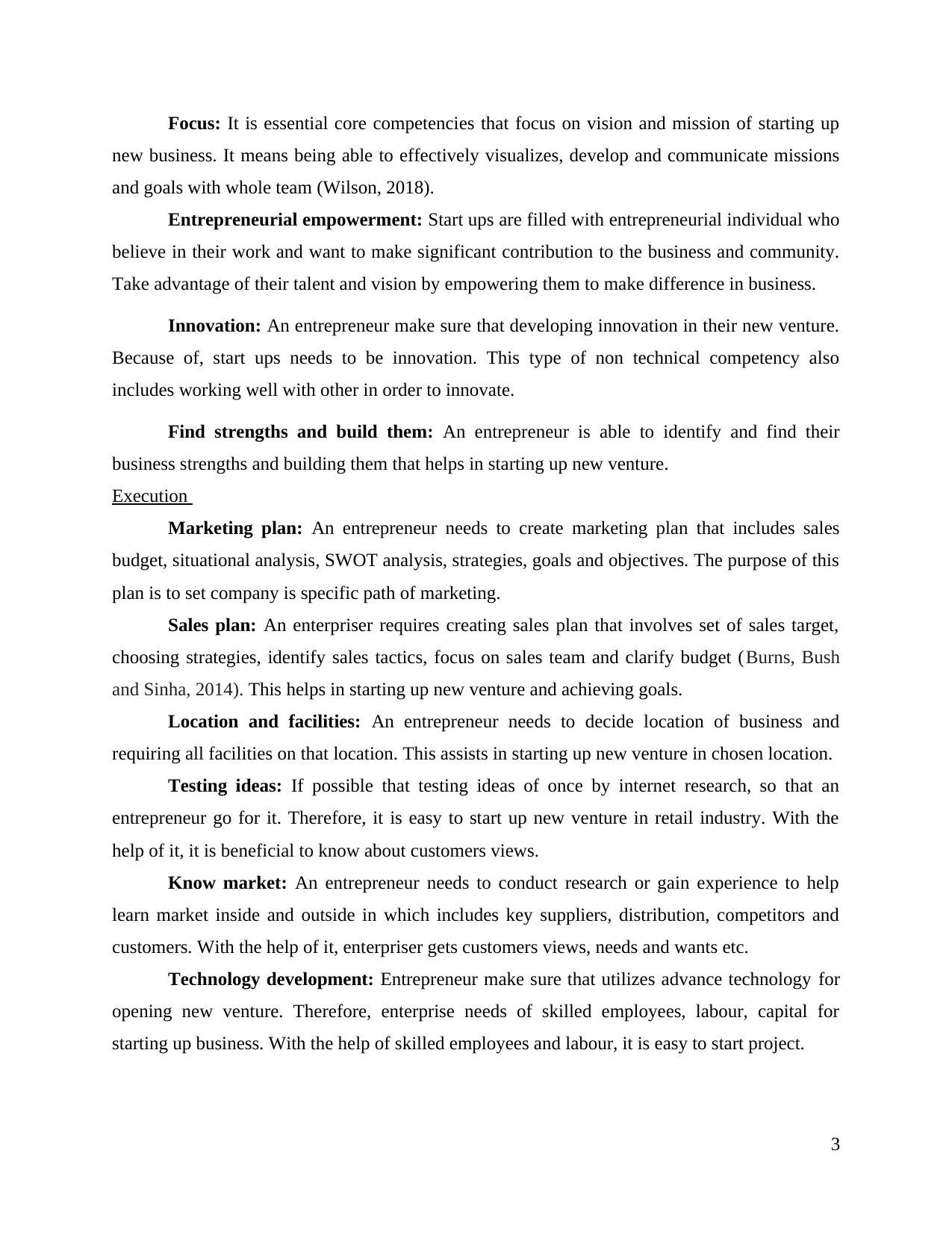
Focus: It is essential core competencies that focus on vision and mission of starting up
new business. It means being able to effectively visualizes, develop and communicate missions
and goals with whole team (Wilson, 2018).
Entrepreneurial empowerment: Start ups are filled with entrepreneurial individual who
believe in their work and want to make significant contribution to the business and community.
Take advantage of their talent and vision by empowering them to make difference in business.
Innovation: An entrepreneur make sure that developing innovation in their new venture.
Because of, start ups needs to be innovation. This type of non technical competency also
includes working well with other in order to innovate.
Find strengths and build them: An entrepreneur is able to identify and find their
business strengths and building them that helps in starting up new venture.
Execution
Marketing plan: An entrepreneur needs to create marketing plan that includes sales
budget, situational analysis, SWOT analysis, strategies, goals and objectives. The purpose of this
plan is to set company is specific path of marketing.
Sales plan: An enterpriser requires creating sales plan that involves set of sales target,
choosing strategies, identify sales tactics, focus on sales team and clarify budget (Burns, Bush
and Sinha, 2014). This helps in starting up new venture and achieving goals.
Location and facilities: An entrepreneur needs to decide location of business and
requiring all facilities on that location. This assists in starting up new venture in chosen location.
Testing ideas: If possible that testing ideas of once by internet research, so that an
entrepreneur go for it. Therefore, it is easy to start up new venture in retail industry. With the
help of it, it is beneficial to know about customers views.
Know market: An entrepreneur needs to conduct research or gain experience to help
learn market inside and outside in which includes key suppliers, distribution, competitors and
customers. With the help of it, enterpriser gets customers views, needs and wants etc.
Technology development: Entrepreneur make sure that utilizes advance technology for
opening new venture. Therefore, enterprise needs of skilled employees, labour, capital for
starting up business. With the help of skilled employees and labour, it is easy to start project.
3
new business. It means being able to effectively visualizes, develop and communicate missions
and goals with whole team (Wilson, 2018).
Entrepreneurial empowerment: Start ups are filled with entrepreneurial individual who
believe in their work and want to make significant contribution to the business and community.
Take advantage of their talent and vision by empowering them to make difference in business.
Innovation: An entrepreneur make sure that developing innovation in their new venture.
Because of, start ups needs to be innovation. This type of non technical competency also
includes working well with other in order to innovate.
Find strengths and build them: An entrepreneur is able to identify and find their
business strengths and building them that helps in starting up new venture.
Execution
Marketing plan: An entrepreneur needs to create marketing plan that includes sales
budget, situational analysis, SWOT analysis, strategies, goals and objectives. The purpose of this
plan is to set company is specific path of marketing.
Sales plan: An enterpriser requires creating sales plan that involves set of sales target,
choosing strategies, identify sales tactics, focus on sales team and clarify budget (Burns, Bush
and Sinha, 2014). This helps in starting up new venture and achieving goals.
Location and facilities: An entrepreneur needs to decide location of business and
requiring all facilities on that location. This assists in starting up new venture in chosen location.
Testing ideas: If possible that testing ideas of once by internet research, so that an
entrepreneur go for it. Therefore, it is easy to start up new venture in retail industry. With the
help of it, it is beneficial to know about customers views.
Know market: An entrepreneur needs to conduct research or gain experience to help
learn market inside and outside in which includes key suppliers, distribution, competitors and
customers. With the help of it, enterpriser gets customers views, needs and wants etc.
Technology development: Entrepreneur make sure that utilizes advance technology for
opening new venture. Therefore, enterprise needs of skilled employees, labour, capital for
starting up business. With the help of skilled employees and labour, it is easy to start project.
3
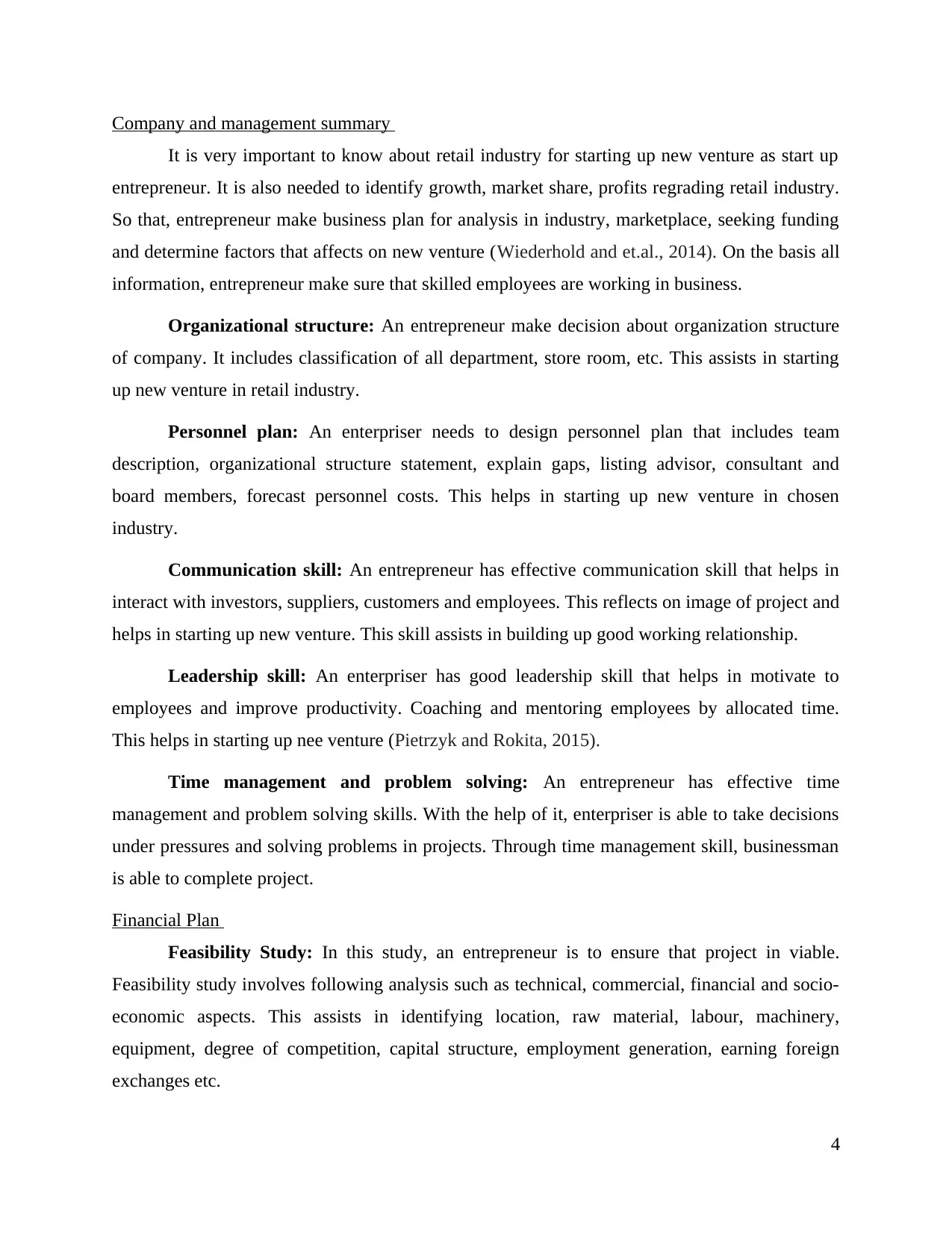
Company and management summary
It is very important to know about retail industry for starting up new venture as start up
entrepreneur. It is also needed to identify growth, market share, profits regrading retail industry.
So that, entrepreneur make business plan for analysis in industry, marketplace, seeking funding
and determine factors that affects on new venture (Wiederhold and et.al., 2014). On the basis all
information, entrepreneur make sure that skilled employees are working in business.
Organizational structure: An entrepreneur make decision about organization structure
of company. It includes classification of all department, store room, etc. This assists in starting
up new venture in retail industry.
Personnel plan: An enterpriser needs to design personnel plan that includes team
description, organizational structure statement, explain gaps, listing advisor, consultant and
board members, forecast personnel costs. This helps in starting up new venture in chosen
industry.
Communication skill: An entrepreneur has effective communication skill that helps in
interact with investors, suppliers, customers and employees. This reflects on image of project and
helps in starting up new venture. This skill assists in building up good working relationship.
Leadership skill: An enterpriser has good leadership skill that helps in motivate to
employees and improve productivity. Coaching and mentoring employees by allocated time.
This helps in starting up nee venture (Pietrzyk and Rokita, 2015).
Time management and problem solving: An entrepreneur has effective time
management and problem solving skills. With the help of it, enterpriser is able to take decisions
under pressures and solving problems in projects. Through time management skill, businessman
is able to complete project.
Financial Plan
Feasibility Study: In this study, an entrepreneur is to ensure that project in viable.
Feasibility study involves following analysis such as technical, commercial, financial and socio-
economic aspects. This assists in identifying location, raw material, labour, machinery,
equipment, degree of competition, capital structure, employment generation, earning foreign
exchanges etc.
4
It is very important to know about retail industry for starting up new venture as start up
entrepreneur. It is also needed to identify growth, market share, profits regrading retail industry.
So that, entrepreneur make business plan for analysis in industry, marketplace, seeking funding
and determine factors that affects on new venture (Wiederhold and et.al., 2014). On the basis all
information, entrepreneur make sure that skilled employees are working in business.
Organizational structure: An entrepreneur make decision about organization structure
of company. It includes classification of all department, store room, etc. This assists in starting
up new venture in retail industry.
Personnel plan: An enterpriser needs to design personnel plan that includes team
description, organizational structure statement, explain gaps, listing advisor, consultant and
board members, forecast personnel costs. This helps in starting up new venture in chosen
industry.
Communication skill: An entrepreneur has effective communication skill that helps in
interact with investors, suppliers, customers and employees. This reflects on image of project and
helps in starting up new venture. This skill assists in building up good working relationship.
Leadership skill: An enterpriser has good leadership skill that helps in motivate to
employees and improve productivity. Coaching and mentoring employees by allocated time.
This helps in starting up nee venture (Pietrzyk and Rokita, 2015).
Time management and problem solving: An entrepreneur has effective time
management and problem solving skills. With the help of it, enterpriser is able to take decisions
under pressures and solving problems in projects. Through time management skill, businessman
is able to complete project.
Financial Plan
Feasibility Study: In this study, an entrepreneur is to ensure that project in viable.
Feasibility study involves following analysis such as technical, commercial, financial and socio-
economic aspects. This assists in identifying location, raw material, labour, machinery,
equipment, degree of competition, capital structure, employment generation, earning foreign
exchanges etc.
4
⊘ This is a preview!⊘
Do you want full access?
Subscribe today to unlock all pages.

Trusted by 1+ million students worldwide
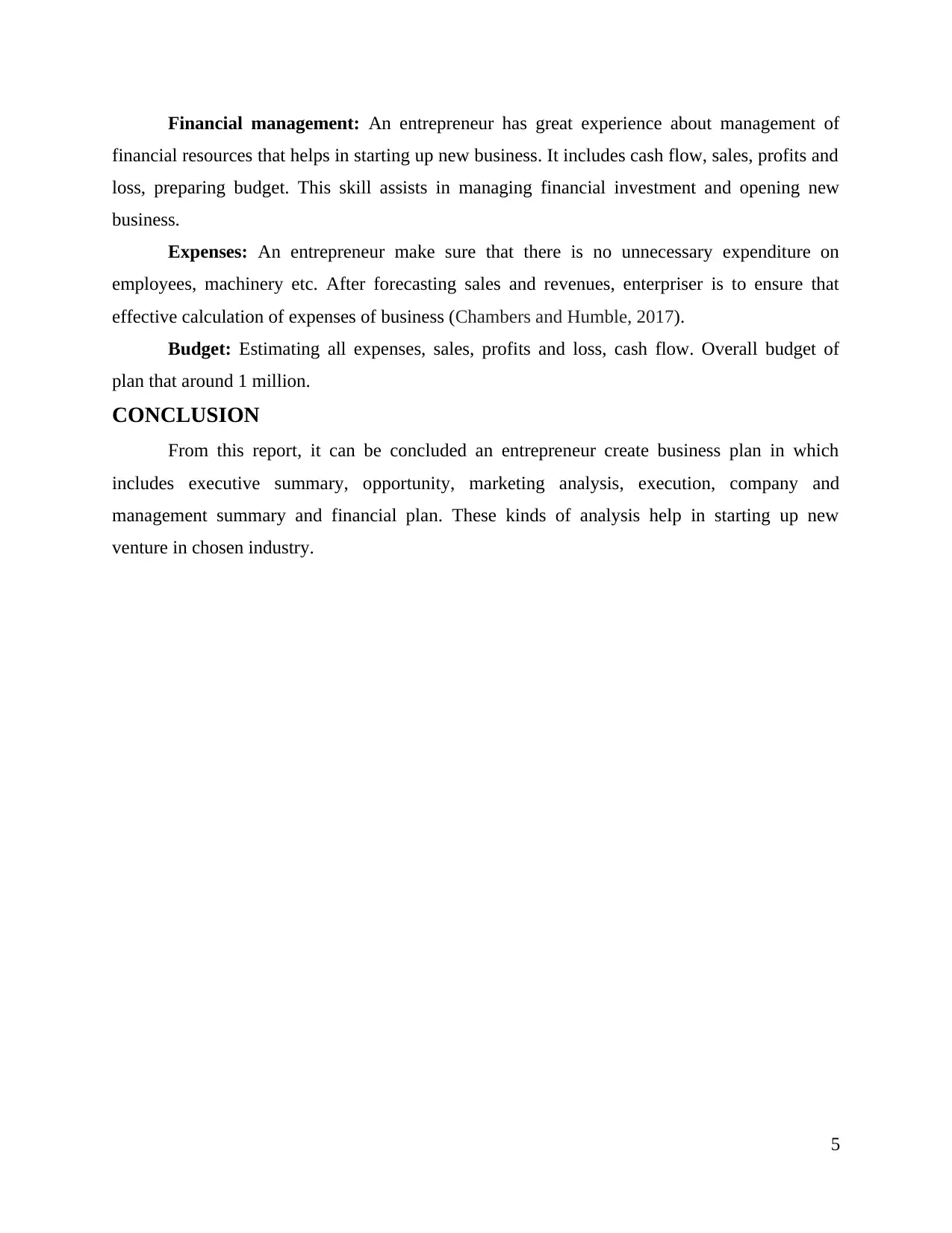
Financial management: An entrepreneur has great experience about management of
financial resources that helps in starting up new business. It includes cash flow, sales, profits and
loss, preparing budget. This skill assists in managing financial investment and opening new
business.
Expenses: An entrepreneur make sure that there is no unnecessary expenditure on
employees, machinery etc. After forecasting sales and revenues, enterpriser is to ensure that
effective calculation of expenses of business (Chambers and Humble, 2017).
Budget: Estimating all expenses, sales, profits and loss, cash flow. Overall budget of
plan that around 1 million.
CONCLUSION
From this report, it can be concluded an entrepreneur create business plan in which
includes executive summary, opportunity, marketing analysis, execution, company and
management summary and financial plan. These kinds of analysis help in starting up new
venture in chosen industry.
5
financial resources that helps in starting up new business. It includes cash flow, sales, profits and
loss, preparing budget. This skill assists in managing financial investment and opening new
business.
Expenses: An entrepreneur make sure that there is no unnecessary expenditure on
employees, machinery etc. After forecasting sales and revenues, enterpriser is to ensure that
effective calculation of expenses of business (Chambers and Humble, 2017).
Budget: Estimating all expenses, sales, profits and loss, cash flow. Overall budget of
plan that around 1 million.
CONCLUSION
From this report, it can be concluded an entrepreneur create business plan in which
includes executive summary, opportunity, marketing analysis, execution, company and
management summary and financial plan. These kinds of analysis help in starting up new
venture in chosen industry.
5
Paraphrase This Document
Need a fresh take? Get an instant paraphrase of this document with our AI Paraphraser
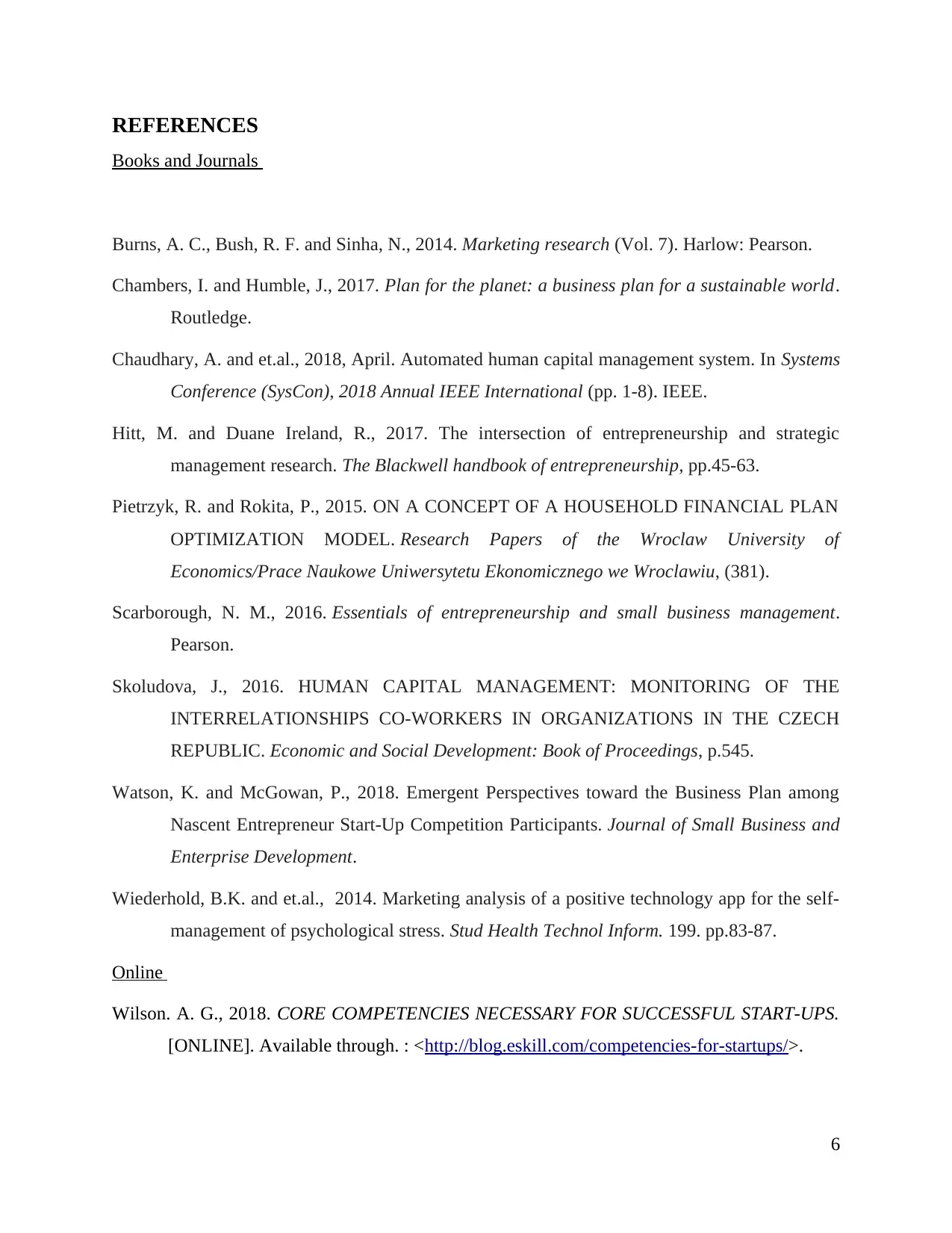
REFERENCES
Books and Journals
Burns, A. C., Bush, R. F. and Sinha, N., 2014. Marketing research (Vol. 7). Harlow: Pearson.
Chambers, I. and Humble, J., 2017. Plan for the planet: a business plan for a sustainable world.
Routledge.
Chaudhary, A. and et.al., 2018, April. Automated human capital management system. In Systems
Conference (SysCon), 2018 Annual IEEE International (pp. 1-8). IEEE.
Hitt, M. and Duane Ireland, R., 2017. The intersection of entrepreneurship and strategic
management research. The Blackwell handbook of entrepreneurship, pp.45-63.
Pietrzyk, R. and Rokita, P., 2015. ON A CONCEPT OF A HOUSEHOLD FINANCIAL PLAN
OPTIMIZATION MODEL. Research Papers of the Wroclaw University of
Economics/Prace Naukowe Uniwersytetu Ekonomicznego we Wroclawiu, (381).
Scarborough, N. M., 2016. Essentials of entrepreneurship and small business management.
Pearson.
Skoludova, J., 2016. HUMAN CAPITAL MANAGEMENT: MONITORING OF THE
INTERRELATIONSHIPS CO-WORKERS IN ORGANIZATIONS IN THE CZECH
REPUBLIC. Economic and Social Development: Book of Proceedings, p.545.
Watson, K. and McGowan, P., 2018. Emergent Perspectives toward the Business Plan among
Nascent Entrepreneur Start-Up Competition Participants. Journal of Small Business and
Enterprise Development.
Wiederhold, B.K. and et.al., 2014. Marketing analysis of a positive technology app for the self-
management of psychological stress. Stud Health Technol Inform. 199. pp.83-87.
Online
Wilson. A. G., 2018. CORE COMPETENCIES NECESSARY FOR SUCCESSFUL START-UPS.
[ONLINE]. Available through. : <http://blog.eskill.com/competencies-for-startups/>.
6
Books and Journals
Burns, A. C., Bush, R. F. and Sinha, N., 2014. Marketing research (Vol. 7). Harlow: Pearson.
Chambers, I. and Humble, J., 2017. Plan for the planet: a business plan for a sustainable world.
Routledge.
Chaudhary, A. and et.al., 2018, April. Automated human capital management system. In Systems
Conference (SysCon), 2018 Annual IEEE International (pp. 1-8). IEEE.
Hitt, M. and Duane Ireland, R., 2017. The intersection of entrepreneurship and strategic
management research. The Blackwell handbook of entrepreneurship, pp.45-63.
Pietrzyk, R. and Rokita, P., 2015. ON A CONCEPT OF A HOUSEHOLD FINANCIAL PLAN
OPTIMIZATION MODEL. Research Papers of the Wroclaw University of
Economics/Prace Naukowe Uniwersytetu Ekonomicznego we Wroclawiu, (381).
Scarborough, N. M., 2016. Essentials of entrepreneurship and small business management.
Pearson.
Skoludova, J., 2016. HUMAN CAPITAL MANAGEMENT: MONITORING OF THE
INTERRELATIONSHIPS CO-WORKERS IN ORGANIZATIONS IN THE CZECH
REPUBLIC. Economic and Social Development: Book of Proceedings, p.545.
Watson, K. and McGowan, P., 2018. Emergent Perspectives toward the Business Plan among
Nascent Entrepreneur Start-Up Competition Participants. Journal of Small Business and
Enterprise Development.
Wiederhold, B.K. and et.al., 2014. Marketing analysis of a positive technology app for the self-
management of psychological stress. Stud Health Technol Inform. 199. pp.83-87.
Online
Wilson. A. G., 2018. CORE COMPETENCIES NECESSARY FOR SUCCESSFUL START-UPS.
[ONLINE]. Available through. : <http://blog.eskill.com/competencies-for-startups/>.
6
1 out of 8
Related Documents
Your All-in-One AI-Powered Toolkit for Academic Success.
+13062052269
info@desklib.com
Available 24*7 on WhatsApp / Email
![[object Object]](/_next/static/media/star-bottom.7253800d.svg)
Unlock your academic potential
Copyright © 2020–2025 A2Z Services. All Rights Reserved. Developed and managed by ZUCOL.





